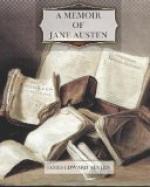’MY DEAR CASSANDRA,—Your letter was truly welcome, and I am much obliged to you for all your praise; it came at a right time, for I had had some fits of disgust. Our second evening’s reading to Miss B. had not pleased me so well, but I believe something must be attributed to my mother’s too rapid way of getting on: though she perfectly understands the characters herself, she cannot speak as they ought. Upon the whole, however, I am quite vain enough and well satisfied enough. The work is rather too light, and bright, and sparkling; it wants shade; it wants to be stretched out here and there with a long chapter of sense, if it could be had; if not, of solemn specious nonsense, about something unconnected with the story; an essay on writing, a critique on Walter Scott, or the history of Buonaparte, or something that would form a contrast, and bring the reader with increased delight to the playfulness and epigrammatism of the general style . . . . The greatest blunder in the printing that I have met with is in page 220, v. 3, where two speeches are made into one. There might as well be no suppers at Longbourn; but I suppose it was the remains of Mrs. Bennett’s old Meryton habits.’
The following letter seems to have been written soon after the last two: in February 1813:—
’This will be a quick return for yours, my dear Cassandra; I doubt its having much else to recommend it; but there is no saying; it may turn out to be a very long and delightful letter. I am exceedingly pleased that you can say what you do, after having gone through the whole work, and Fanny’s praise is very gratifying. My hopes were tolerably strong of her, but nothing like a certainty. Her liking Darcy and Elizabeth is enough. She might hate all the others, if she would. I have her opinion under her own hand this morning, but your transcript of it, which I read first, was not, and is not, the less acceptable. To me it is of course all praise, but the more exact truth which she sends you is good enough . . . . Our party on Wednesday was not unagreeable, though we wanted a master of the house less anxious and fidgety, and more conversable. Upon Mrs. —–’s mentioning that she had sent the rejected addresses to Mrs. H., I began talking to her a little about them, and expressed my hope of their having amused her. Her answer was, “Oh dear yes, very much, very droll indeed, the opening of the house, and the striking up of the fiddles!” What she meant, poor woman, who shall say? I sought no farther. As soon as a whist party was formed, and a round table threatened, I made my mother an excuse and came away, leaving just as many for their round table as there were at Mrs. Grant’s. {107} I wish they might be as agreeable a set. My mother is very well, and finds great amusement in glove-knitting, and at present wants no other work. We quite run over with books. She has got Sir John Carr’s “Travels in




